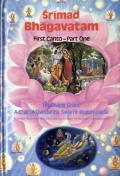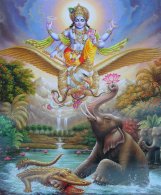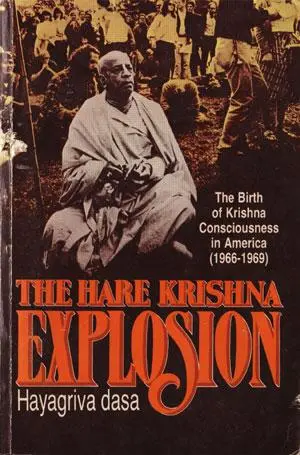click on image to enlarge
The Insulting of Draupadi
I have always found this story of the disrobing of Draupadī, the wife of the godly King Yudhiṣṭhira, to be and example of how Krsna always protects his pure devotees. This incident contributes greatly to the Great Battle of Kurukṣetra, which almost completely annihilated the Kuru’s. And is a very good example of Spiritual Blindness. The following is a few select verses from the Srimad-Bhagavatam and Bhagavad-gita As It Is.
Dhṛtarāṣṭra was blind from birth, but his blindness in committing impious activities to support his dishonest sons was a greater blindness than his physical lack of eyesight. The physical lack of sight does not bar one from spiritual progress. But when one is blind spiritually, even though physically fit, that blindness is dangerously detrimental to the progressive path of human life. (SB 3.1.7 purport)
Dhṛtarāṣṭra was blind from birth. Unfortunately, he was also bereft of spiritual vision. He knew very well that his sons were equally blind in the matter of religion, and he was sure that they could never reach an understanding with the Pāṇḍavas, who were all pious since birth. (Bg 1.2 purport)
Srimad-Bhagavatam
By His Divine Grace A. C. Bhaktivedanta Swami Prabhupada
Canto 3, chapter 1, Text 6-7
śrī-śuka uvāca
yadā tu rājā sva-sutān asādhūn
puṣṇan na dharmeṇa vinaṣṭa-dṛṣṭiḥ
bhrātur yaviṣṭhasya sutān vibandhūn
praveśya lākṣā-bhavane dadāha
śrī-śukaḥ uvāca—Śrī Śukadeva Gosvāmī said; yadā—when; tu—but; rājā—King Dhṛtarāṣṭra; sva-sutān—his own sons; asādhūn—dishonest; puṣṇan—nourishing; na—never; dharmeṇa—on the right path; vinaṣṭa-dṛṣṭiḥ—one who has lost his insight; bhrātuḥ—of his brother; yaviṣṭhasya—younger; sutān—sons; vibandhūn—having no guardian (father); praveśya—made to enter; lākṣā—lacquer; bhavane—in the house; dadāha—set on fire.
TRANSLATION
Śrī Śukadeva Gosvāmī said: King Dhṛtarāṣṭra became blind under the influence of impious desires to nourish his dishonest sons, and thus he set fire to the lacquer house to burn his fatherless nephews, the Pāṇḍavas.
PURPORT
Dhṛtarāṣṭra was blind from birth, but his blindness in committing impious activities to support his dishonest sons was a greater blindness than his physical lack of eyesight. The physical lack of sight does not bar one from spiritual progress. But when one is blind spiritually, even though physically fit, that blindness is dangerously detrimental to the progressive path of human life.
TEXT 7
yadā sabhāyāṁ kuru-deva-devyāḥ
keśābhimarśaṁ suta-karma garhyam
na vārayām āsa nṛpaḥ snuṣāyāḥ
svāsrair harantyāḥ kuca-kuṅkumāni
yadā—when; sabhāyām—the assembly; kuru-deva-devyāḥ—of Draupadī, the wife of godly Yudhiṣṭhira; keśa-abhimarśam—insult by grabbing her hair; suta-karma—action taken by his son; garhyam—which was abominable; na—did not; vārayām āsa—forbid; nṛpaḥ—the King; snuṣāyāḥ—of his daughter-in-law; svāsraiḥ—by her tears; harantyāḥ—of she who was washing; kuca-kuṅkumāni—red dust on her breast.
TRANSLATION
The King did not forbid his son Duḥśāsana’s abominable action of grabbing the hair of Draupadī, the wife of the godly King Yudhiṣṭhira, even though her tears washed the red dust on her breast.
Also from;
The Blind King
Bhagavad-gita As It Is
By HIs Divine Grace A.C. Bhaktivedanta Swami Prabhpada
Chapter 1, Text 2, 9 & 11
sañjaya uvāca
dṛṣṭvā tu pāṇḍavānīkaṁ
vyūḍhaṁ duryodhanas tadā
ācāryam upasaṅgamya
rājā vacanam abravīt
sañjayaḥ—Sañjaya; uvāca—said; dṛṣṭvā—after seeing; tu—but; pāṇḍava-anīkam—the soldiers of the Pāṇḍavas; vyūḍham—arranged in military phalanx; duryodhanaḥ—King Duryodhana; tadā—at that time; ācāryam—the teacher; upasaṅgamya—approaching nearby; rājā—the king; vacanam—words; abravīt—spoke.
TRANSLATION
Sañjaya said: O King, after looking over the army gathered by the sons of Pāṇḍu, King Duryodhana went to his teacher and began to speak the following words:
PURPORT
Dhṛtarāṣṭra was blind from birth. Unfortunately, he was also bereft of spiritual vision. He knew very well that his sons were equally blind in the matter of religion, and he was sure that they could never reach an understanding with the Pāṇḍavas, who were all pious since birth. Still he was doubtful about the influence of the place of pilgrimage, and Sañjaya could understand his motive in asking about the situation on the battlefield. He wanted, therefore, to encourage the despondent King, and thus he warned him that his sons were not going to make any sort of compromise under the influence of the holy place. Sañjaya therefore informed the King that his son, Duryodhana, after seeing the military force of the Pāṇḍavas, at once went to the commander-in-chief, Droṇācārya, to inform him of the real position. Although Duryodhana is mentioned as the king, he still had to go to the commander on account of the seriousness of the situation. He was therefore quite fit to be a politician. But Duryodhana’s diplomatic veneer could not disguise the fear he felt when he saw the military arrangement of the Pāṇḍavas.
anye ca bahavaḥ śūrā
mad-arthe tyakta-jīvitāḥ
nānā-śastra-praharaṇāḥ
sarve yuddha-viśāradāḥ
anye—many others; ca—also; bahavaḥ—in great numbers; śūrāḥ-heroes; mad-arthe—for my sake; tyakta-jīvitāḥ—prepared to risk life; nānā—many; śastra-weapons; praharaṇāḥ—equipped with; sarve—all of them; yuddha—battle; viśāradāḥ—experienced in military science.
TRANSLATION
There are many other heroes who are prepared to lay down their lives for my sake. All of them are well equipped with different kinds of weapons, and all are experienced in military science.
PURPORT
As far as the others are concerned—like Jayadratha, Kṛtavarmā, Śalya, etc.—all are determined to lay down their lives for Duryodhana’s sake. In other words, it is already concluded that all of them would die in the Battle of Kurukṣetra for joining the party of the sinful Duryodhana. Duryodhana was, of course, confident of his victory on account of the above-mentioned combined strength of his friends.
ayaneṣu ca sarveṣu
yathā-bhāgam avasthitāḥ
bhīṣmam evābhirakṣantu
bhavantaḥ sarva eva hi
ayaneṣu—in the strategic points; ca—also; sarveṣu—everywhere; yathābhāgam—as they are differently arranged; avasthitāḥ—situated; bhīṣmam—unto Grandfather Bhīṣma; eva—certainly; abhirakṣantu—support may be given; bhavantaḥ—all of you; sarve—respectively; eva—certainly; hi—and exactly.
TRANSLATION
Now all of you must give full support to Grandfather Bhīṣma, standing at your respective strategic points in the phalanx of the army.
PURPORT
Duryodhana, after praising the prowess of Bhīṣma, further considered that others might think that they had been considered less important, so in his usual diplomatic way, he tried to adjust the situation in the above words. He emphasized that Bhīṣmadeva was undoubtedly the greatest hero, but he was an old man, so everyone must especially think of his protection from all sides. He might become engaged in the fight, and the enemy might take advantage of his full engagement on one side. Therefore, it was important that other heroes would not leave their strategic positions and allow the enemy to break the phalanx. Duryodhana clearly felt that the victory of the Kurus depended on the presence of Bhīṣmadeva. He was confident of the full support of Bhīṣmadeva and Droṇācārya in the battle because he well knew that they did not even speak a word when Arjuna’s wife Draupadī, in her helpless condition, had appealed to them for justice while she was being forced to strip naked in the presence of all the great generals in the assembly. Although he knew that the two generals had some sort of affection for the Pāṇḍavas, he hoped that all such affection would now be completely given up by them, as was customary during the gambling performances.















